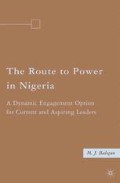Abstract
Even if the event of January 15, 1966, turned out to be a military coup rather than voluntary transfer of power, it was an unusual kind of coup. The seismic changes it brought notwithstanding, power reverted not to the aggrieved Majors who sacked the civilians but to the military top brass that was least prepared for the upcoming governorship challenges. That was not all. The coup might have accidentally placed the burden of leadership on the military, but it soon became the model that subsequent regimes copied. For approximately 30 years, Nigeria was ruled by a succession of men in uniform. As noted in the coming paragraphs, the impact that each regime had on the environment varied depending not only on its motives but also on its preparedness for governorship and related challenges, as well as on the caliber of those holding key positions under it. Although some of the regimes left lasting legacies, others merely filled the power vacuum, sometimes taking the opportunity to settle personal scores, or to advance vaguely defined agendas.
Access this chapter
Tax calculation will be finalised at checkout
Purchases are for personal use only
Preview
Unable to display preview. Download preview PDF.
Notes
Alii regards the Okar/Mukoro coup attempt of 1990 as evidence of the intraregional rivalry between the Hausa-Fulani and the Middle-Belt communities, and of the oil-producing areas’ resentment of northern domination. See M. Chris Alii, 2001, The Federal Republic of Nigerian Army (Ikeja: Malthouse Press), pp. 218–220.
According to Ihonde, Garba turned against Gowon when the latter’s marriage impeded the former’s access to the head of state. See Ihonde, Moses, 2004, First Call: An Account of the Gowon Years (Lagos: Diamond Publications), pp. 67–71.
Copyright information
© 2009 M. J. Balogun
About this chapter
Cite this chapter
Balogun, M.J. (2009). Leadership as an Imposition: the Military Shortcut to Power. In: The Route to Power in Nigeria. Palgrave Macmillan, New York. https://doi.org/10.1057/9780230100848_9
Download citation
DOI: https://doi.org/10.1057/9780230100848_9
Publisher Name: Palgrave Macmillan, New York
Print ISBN: 978-1-349-38205-7
Online ISBN: 978-0-230-10084-8
eBook Packages: Palgrave Political & Intern. Studies CollectionPolitical Science and International Studies (R0)

